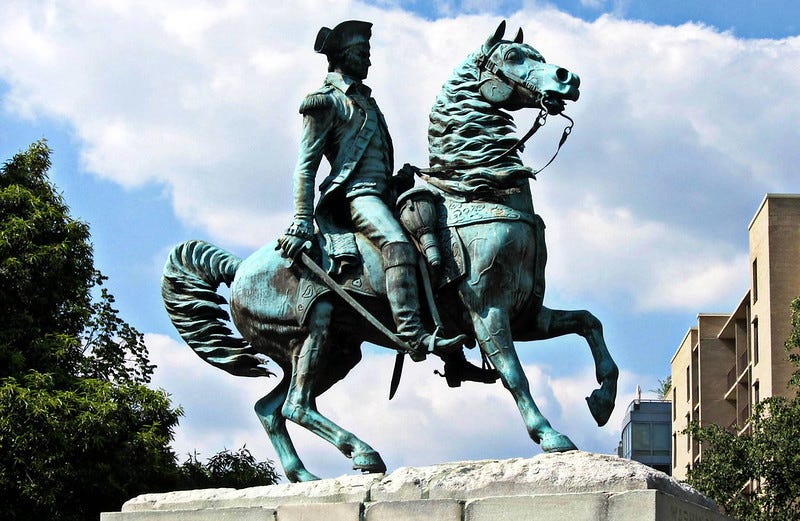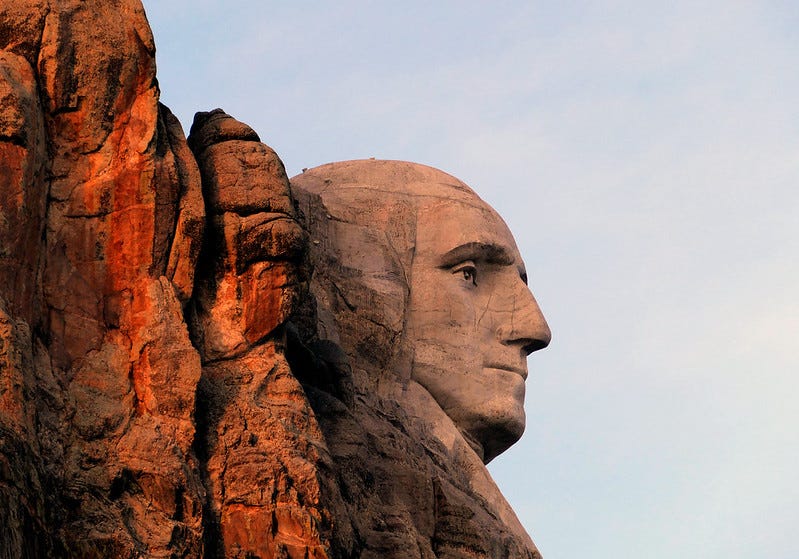The Day George Washington Took Command
“I heard the bullets whistle, and, believe me there is something charming in the sound”
Two hundred forty-eight years ago this July 3, George Washington took command of the Continental Army. When the question had come before the Continental Congress the month before, not a single delegate had voted against him. Founding Father John Adams later joked that Washington’s talent for getting elected came from always being “the tallest man in the room,” but he was commended by more than his imposing 6’2: Washington’s commanding presence, unbreakable spirit, and perseverance in the face of terrible odds all established him as a formidable leader of men at the time of his nation’s trial.
An equestrian statue of George Washington in Boston Public Garden, by where the Continental Army first camped. Phil Roeder/Flickr.
Washington was chosen for command in part because he was already battletested by the French and Indian War, during which he fought for the British army and gained valuable military experience. He miraculously survived one battle with “four bullets through my coat,” and later admitted: “I heard the bullets whistle, and, believe me there is something charming in the sound,” demonstrating the sangfroid in battle for which he would later be known.
His time spent fighting for the British Army caused in him some remorse when he was eventually required to turn his sword against his former comrades. At the war’s beginning, he wrote that it is “unhappy” to “reflect… that a Brother’s Sword has been sheathed in a Brother’s breast,” but Washington, he concluded: “can a virtuous Man hesitate in his choice?”
His first great victory came after taking command of the American forces besieging Boston, which the British had captured and fortified. Though Washington at first wanted to attack the city directly, he wisely listened to his officers, who warned him against such a potentially disastrous move. The commander in chief sent his troops to move cannons from Fort Ticonderoga to an elevated position outside of Boston, ideal for menacing the British from above. When the British saw this artillery pointing down at them, they promptly abandoned the city.
He wasn’t always so successful. After victory in Boston, Washington was defeated in New York by a seaborne British army that forced the Continentals’ retreat. But following that defeat came Washington’s celebrated crossing of the Delaware and his twin victories at Trenton and Princeton. These victories rallied the Continentals’ flagging morale and proved that Americans could match the much-vaunted crack British infantry.
The next several years of the war would see hard fighting and seesawing fortunes. The Continental Army soldiers were often underfed, underpaid, and facing supply crises, but Washington held them together as a cohesive fighting force, most famously at Valley Forge, where military reforms hammered them into a more disciplined and powerful army.
An equestrian statue of George Washington in Foggy Bottom in Washington DC. NCinDC/Flickr.
That army, under Washington’s leadership and with the help of America’s French allies, proved itself later when it bottled up and defeated a strong British army at Yorktown in 1781. Washington’s victory secured more than 7,000 British troops’ surrender, dealing a massive blow to the Crown’s war effort. Hearing of the defeat, British Prime Minister Lord North said, “Oh God. It is all over. It is all over.” Though peace took another two years, Lord North was correct: Yorktown marked the end of effective British military power in America. The United States had George Washington and his brave troops to thank for securing independence.
Why should you care?
George Washington, “the indispensable man” and the “father of his country,” richly merits both titles. Without his leadership skills, determination, and willpower, it is very likely the American war effort would have faced early collapse.
His campaigns weren’t always successful, but Washington was still a shining commander; he forged a disciplined army out of a ragtag collection of militias and kept it fighting in the field against a much better equipped, better trained, and better supplied enemy. That, in and of itself, is enough to cement his reputation as a great military leader.
Washington’s strategic foresight was crucial at the Boston and Yorktown campaigns, as well as the battles of Trenton and Princeton, where strategic decisions and willingness to recognize his subordinates’ sound advice, sealed success for American arms.
George Washington, carved into Mount Rushmore in South Dakota. Bernard Spragg NZ/Flickr.
Washington’s reputation has been historically unparalleled in most Americans’ estimation, but recent years have seen it come under attack. Modern day vandals would destroy his legendary status and achievements because they judge 18th century men by 21st century standards—even as they enjoy living in the prosperous and free nation that owes Washington its very existence.
Washington wasn’t perfect, but he is an historical giant and probably the most important figure in American history. “Perseverance and Spirit have done Wonders in all ages,” Washington once said, and his own life certainly bears witness to that. On this anniversary of his taking command, remember Washington’s spirit, his strength, and the sacrifices of those who followed him into battle—these were the things that forged a nation against overwhelming odds.








I am so glad these beautiful equestrian statues are not in Richmond, Virginia. They would have been taken down and dumped on their sides at the Richmond wastewater treatment plant with our other equestrian statues.